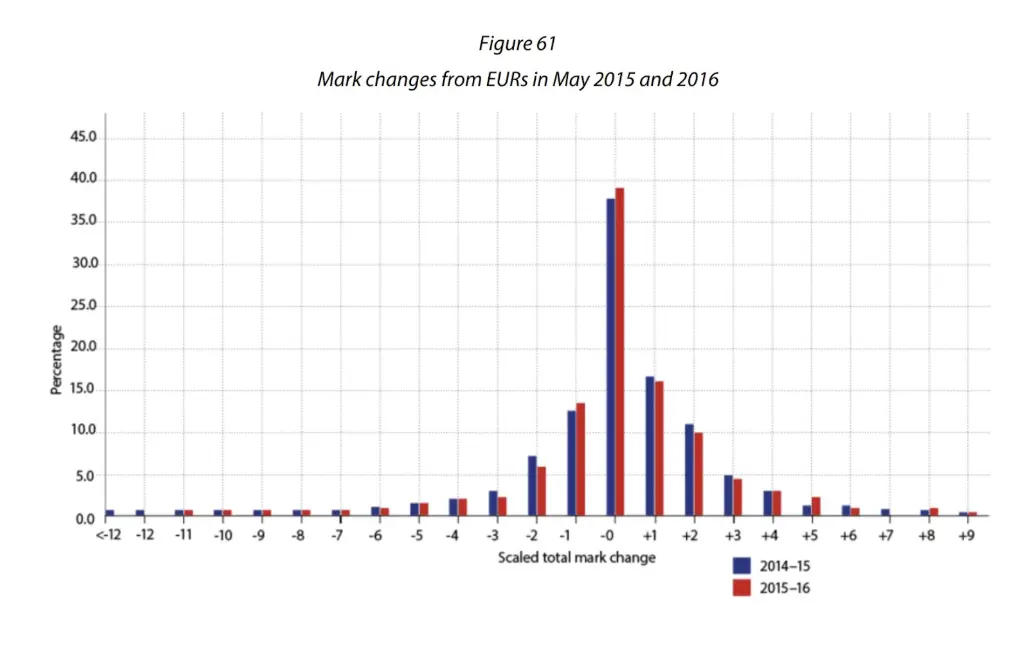

Getting your IB results is very stressful. The IB is two-year grueling process of which you have worked very hard for. Whether you're thrilled with your scores or devastated by unexpected grades, you might be wondering: "Should I get my IB score re-marked?" It's a question that thousands of IB students ask themselves each year, and the answer isn't always straightforward.
If you're feeling disappointed with your results, remember that grades don't define your potential or abilities. The IB Diploma Programme is incredibly demanding, and that's exactly why the IB offers options like re-marks, re-moderation, and retakes. You have options, and we're here to help you understand them.
Understanding IB Re-marks: A Quick Overview
Before diving into whether you should pursue a re-mark, let's clarify what exactly an IB re-mark is. A re-mark, formally known as an "Enquiry Upon Results" (EuR), is when you request that your exam papers or internal assessments be evaluated again by a different examiner.
Key points about IB re-marks:
- Your grades can go up, down, or stay the same
- You need written consent from yourself (or your legal guardian if you're under 18)
- The typical deadline for May exam sessions is Mid-September, and for November exams, it is Mid-March
- A remark costs €88, but if your grade changes (up or down), you're entitled to a refund
- In most cases, the grade does not change
The process involves your IB coordinator submitting the request on your behalf. Responses to IB EURs typically take two weeks, though this can vary depending on the type of re-mark requested.
💡IB results day is a major milestone after two years of hard work. This guide breaks down what your scores mean, how to interpret them, and what steps you can take next.
Different types of re-marks
The IB offers several distinct types of re-marks and re-moderation options, each designed for different situations and purposes. Understanding these categories is crucial for making an informed decision about which option best suits your needs.
Category 1 Re-mark (Individual Candidate)
This is the most common type of re-mark request and what most students think of when considering a re-mark.
What it covers:
- Your externally assessed subject components only
- Conducted by senior IB examiners who evaluate possible errors in previous marking
- Can be requested for any externally assessed component of your subjects
Key characteristics:
- Risk level: High - grades can increase, decrease, or stay the same
- Processing time: 18 days
- Cost: Standard re-mark fee (refunded if grade changes)
- Examiner: Usually a different examiner than the original marker
When to consider: If you're close to grade boundaries on external exams and believe there may have been marking errors.
Other considerations:
- You can only request one re-mark per subject
- Different examiners may have different marking styles
- Small entry subjects might use the same examiner
- Consider how close you are to grade boundaries before proceeding
Category 1 Report
This option provides detailed feedback without the risk of grade changes.
What it covers:
- Detailed comments and analysis of your re-marked work
- Insights into marking decisions and any errors identified
- Marks awarded during the re-marking process
Key characteristics:
- Risk level: None - no grade changes occur
- Processing time: 30 days
- Cost: Separate fee for the report
- Purpose: Understanding rather than grade improvement
When to consider: If you want to understand how your work was marked or get feedback for future improvement, without risking your current grade.
Other considerations:
- Perfect for understanding your performance without risk
- Useful if you plan to retake and want specific feedback
- Can be requested within one month of receiving Category 1 re-mark results
- More expensive since you pay for both the re-mark and report
💡Aiming for a 7 in IB Maths AA, s student sought help from Top IB Tutors. See why tutoring made all the difference!
Category 2A (Teacher/School Request)
This is a request made by your school's teachers or faculty members, not individual students.
What it covers:
- Externally assessed components for review by teaching staff
- Digital PDFs of student answers and final grades
- Available to teachers, faculty, and specific candidates
Key characteristics:
- Risk level: None - no grade changes occur
- Processing time: 18 days
- Initiated by: School staff, not individual students
- Purpose: Educational review and understanding
When to consider: This isn't something you request directly - your teachers might initiate this if they want to review how a class performed on specific papers.
Category 2B (Subject/Level Request)
Another school-initiated request covering broader scope.
What it covers:
- Subject/level re-mark request for all candidates taking that subject
- All externally assessed materials for the subject must be returned
- Materials available to teachers, faculty, and specific candidates
Key characteristics:
- Risk level: None - no grade changes occur
- Processing time: 10 days
- Initiated by: School staff
- Scope: Entire subject level, not individual students
When to consider: Again, this is typically initiated by schools rather than individual students, often used before ordering Category 1 re-marks.

Category 3 Re-moderation (Internal Assessments)
This specifically applies to your internal assessments (IAs) and has the most favorable risk profile.
What it covers:
- Internal assessments only (not external exams)
- Re-evaluation of your IA work by a different moderator
- Available only when specific criteria are met
Eligibility requirements:
- The mean of candidates' moderated IA marks must differ from teacher-awarded marks by at least 15% of the maximum mark for the IA component
- Not available for Language A: Literature SL school-supported, self-taught candidates
Key characteristics:
- Risk level: Low - marks and grades can increase but cannot decrease
- Processing time: 40 days (longest processing time)
- Cost: Standard re-moderation fee (no refund available)
- Examiner: Usually a different moderator than the original
When to consider: If you believe your IA was marked too harshly and the class average suggests systematic under-marking. This is the safest option since grades cannot go down.
Other considerations:
- The 15% threshold requirement is strict
- Your teacher's marking must be consistently different from the moderated results
- This is often the best option if you suspect IA marking issues
- Takes the longest but has the lowest risk
When Should You Consider a Re-mark?
1. You're Close to a Grade Boundary
This is the most compelling reason to consider a re-mark. If you're just a few marks away from the next grade level, a re-mark might push you over the edge. Check your detailed results to see how close you are to the grade boundaries.
I actually have first-hand experience when I graduated in 2014. I got a B on my Extended Essay despite my EE supervisor saying it should have been an A. I got it re-marked and it bumped me to an A so I got the three bonus points and ending with a 44.
2. Your Performance Doesn't Match Your Preparation
If you consistently performed at a higher level throughout the course and your exam result seems like an outlier, a re-mark might be worth considering. However, remember that exam conditions can affect performance in ways that coursework doesn't.
3. You Need Specific Grades for University Admission
If you're one or two points away from meeting your university's conditional offer requirements, a re-mark could be the difference between acceptance and rejection. In these high-stakes situations, the cost and risk might be worth it.
4. Your Internal Assessment Grade Seems Inconsistent
If your IA grade is significantly lower than what you expected based on your teacher's feedback, and the mean score differs substantially from your class average, you might be eligible for re-moderation.
💡Every subject IA is different. But the IB marking criteria is very clear. Get expert help from the best IB tutors in the world!

When You Should Think Twice
1. You're Satisfied with Your Overall Diploma Score
If your overall points total meets your goals, even if individual subject grades are disappointing, consider whether the re-mark is really necessary. Universities typically care more about your total points than individual subject grades.
2. You're Already Well Above Grade Boundaries
If you're comfortably within a grade level (not close to boundaries), a re-mark is unlikely to change your grade and might even lower it.
3. You Have Alternative Options
Consider whether retaking the exam might be a better option than re-marking. With retakes, you have the opportunity to improve your preparation and potentially achieve significantly better results.
4. Financial Constraints
While the €88 fee is refunded if your grade changes, you'll lose this money if your grade stays the same, which happens in most cases.
The Reality Check: Success Rates and Outcomes
While the IB doesn't publish official statistics on re-mark success rates, educational professionals report that in most cases, the grade does not change. This means that the majority of re-mark requests result in the same grade.
However, when grades do change, they can go either direction. As there is a possibility that a grade is lowered, written consent from the candidate (or legal guardian) is required. This risk factor is crucial to consider in your decision-making process.
There is some data we can look, although it is from nearly 10 years ago.

The results are quite similar from year to year with only very small variations. ~40% of the time there is no change in grade. ~35% of the time results increase and ~25% of the time results decrease.
Making Your Decision: A Step-by-Step Approach
- Check your detailed results - Look at how close you are to grade boundaries
- Consider your goals - Do you need specific grades for university admission?
- Assess the risk - Are you comfortable with the possibility of your grade going down?
- Evaluate alternatives - Would a retake be more beneficial than a re-mark?
- Consult your coordinator - Get professional advice from your IB coordinator
- Consider the timeline - Remember that re-marks take time, which might affect university applications
Alternative Options to Consider
If you're unsure about re-marking, consider these alternatives:
IB Retakes: If you have time before university applications are due, retaking your exams might give you a better chance of improvement than re-marking.
University Appeals: Some universities are flexible with their grade requirements, especially if you're close to meeting them.
Gap Year: Taking a year to retake your exams can provide more time for preparation and better results.
The Bottom Line
Re-marking can be a valuable option, but it's not a magic solution. The decision should be based on careful consideration of your specific circumstances, goals, and the potential risks involved.
Remember, in most cases, the grade does not change, so approach re-marking with realistic expectations. If you're close to grade boundaries, need specific grades for university admission, or have concerns about internal assessment marking, a re-mark might be worth considering.
However, if you're satisfied with your overall diploma score or are well within grade boundaries, the risk and cost might not be justified.
Need More Support?
Making decisions about your IB results can be stressful, and you don't have to navigate this alone. Consider speaking with:
- Your IB coordinator for professional guidance
- University admissions offices about their flexibility with grade requirements
- Educational consultants who specialise in IB programs
- Tutoring services that can help you prepare for retakes if that's a better option
Remember, your IB journey doesn't end with your results. Whether you choose to re-mark, retake, or move forward with your current grades, there are always paths to achieve your academic and career goals.
Whatever you decide, make sure it's an informed decision that aligns with your goals and circumstances. Your future success isn't determined by a single set of exam results – it's shaped by your resilience, determination, and willingness to keep moving forward.





